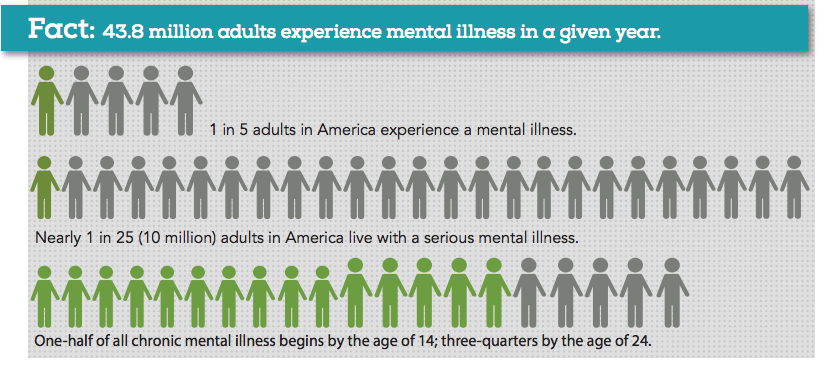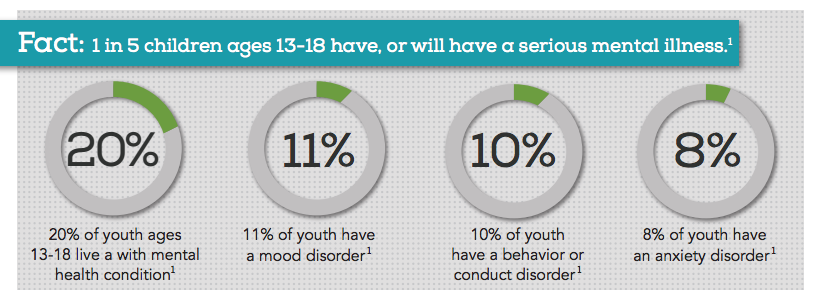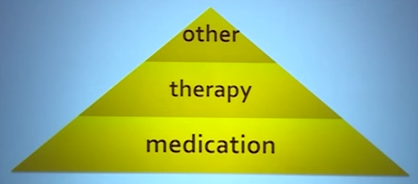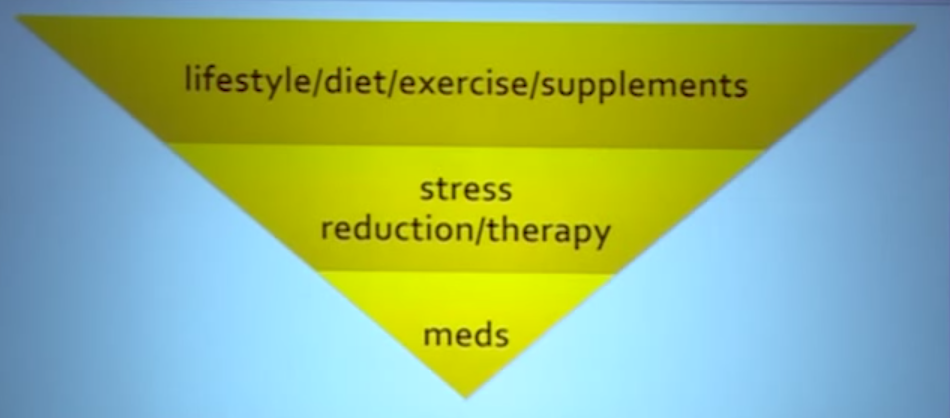What if I told you that nutrition could be more effective at preventing and treating mental illnesses than prescription drugs?
Would you seriously believe me?
At first, probably not, and understandably so.
After all, our current health system places little to no emphasis on nutrition and instead uses conventional medicine (read: expensive prescription medications) to treat mental illnesses.
But I had to wonder if these treatment options are really all that effective, especially since studies have shown that “anxiety and depression are markedly higher than they were in earlier years,” according to a combination of research presented in Psychology Today.
It turns out, I’m not alone in this thinking.
Clinical psychologist Julia Rucklidge offered up a plethora of research to support this theory in her impactful Tedx talk on The Surprisingly Dramatic Role of Nutrition in Mental Health, which we’ll be discussing today.
Current Mental Health Statistics

If we take a look at the current mental health statistics here in the United States, the results are pretty shocking:
- “1 in 5 adults in America experience mental illness”
- “Nearly 1 in 25 (10 million) adults in America live with a serious mental illness”
- “One-half of all chronic mental illness begins by the age of 14; three-quarters by the age of 24”
According to the National Alliance of Mental Illness (NAMI), this means that “43.8 million adults experience mental illness in a given year.”
And if that wasn’t alarming enough, the NAMI also found that “1 in 5 children ages 13-18 have, or will have a serious mental illness.”
It’s bad enough that we as adults have to deal with this problem, but now our kids, who are even less equipped to handle this properly, have to struggle as well.
Current Mental Health Treatment

According to Rucklidge, our current medical system uses the treatment route of medication first, therapy second, and all the other forms of self-help third.
As a result, the use of antidepressants and antipsychotics is on the rise.
“From 1999 to 2012 the percentage of Americans on antidepressants increased from 6.8% to 13%, according to the Journal of the American Medical Association.
Unfortunately, just because more people are being prescribed these medications doesn’t mean they’re working well for everyone.
Don’t get me wrong, these prescriptions certainly better lots of lives and prevent countless suicides every year; it’s just that studies are now showing that this relief is only temporary for some.
As Rucklidge points out, this class of medications is effective in the short run, but not in the long run, and in some cases, “they make life worse.”
How effective are our current treatments?

If the rates of mental disorders and disabilities as a result of mental illness keep increasing, despite all the prescription-based intervention, maybe the current treatment options aren’t really working that well.
There’s some evidence to support this:
In one study, researchers concluded that when kids diagnosed with attention deficit hyperactivity disorder (ADHD) were treated with stimulants such as ritalin, they saw an improvement and responded better to treatment in the short term.
However, in the long run, “they fair[ed] less well than children who were never prescribed these medications,” Rucklidge notes.
After poring over the evidence uncovered from this study, Rucklidge determined that, “Despite our ever increasing reliance on antidepressants, the recovery rates are no better now than what they were 50 years ago prior to the advent of medications.”
The last study Rucklidge cites involves children with depression.
When children were treated with antidepressants, they were three times more likely to convert to bipolar disorder as compared to children who had never taken the medications. Yikes!
Where does the problem stem from?

In Rucklidge’s opinion (and mine), it’s a lack of education.
Doctors are not taught to understand the complexities of nutrition and the true benefits of eating a healthy diet in med school. They’re taught about how medicine, drugs, and modern science can be used to treat these conditions instead.
Because of this, Rucklidge has spent the last decade working on reversing this way of thinking with scientific evidence to back the theory that nutrition has a huge role to play in our mental health.
She performed her own randomized, placebo controlled trial using micronutrients on adults suffering with ADHD and had her study published in the British Journal of Psychiatry to prove her point of view.
Micronutrients to the Rescue

For this trial, 80 adults with ADHD were given either micronutrients or a placebo over the course of eight weeks. The micronutrients consisted of as many as 15 pills per day packed with 36 important nutrients.
The results were astonishing to say the least. Here’s what Rucklidge uncovered:
- “Within the 8-week period, twice as many people responded in the micronutrient group compared with the placebo.”
- “Twice as many people went into remission in their depression in the micronutrient group.”
- “Hyperactivity and impulsivity reduced into the normal, non clinical range.”
- “Those who were taking the micronutrients were more likely to report that their ADHD symptoms were less impairing and interfering… than people on the placebo.”
But Rucklidge didn’t stop there. She set out to demonstrate that these results were not just limited to her one study.
She learned that this form of treatment could also:
- Reduce the symptoms of bipolar within a 6-month time frame, which led to a reduction in medication usage too
- Reduce PTSD from 65% down to 18%, using, get this, a one month intervention
Now, it’s important to note that these micronutrients are not like a typical multivitamin you’d find over the counter, as Rucklidge states. These are nutritionally packed supplements in high doses we’re talking about here.
So while these results are positive, they certainly don’t give you that ‘eat like crap and pop a multivitamin to fix it’ pass.
I cannot reiterate Rucklidge’s messages enough: “Nutrition matters” and “Optimizing nutrition is a safe and viable way to avoid, treat, or lessen mental illnesses.”
By giving your body and mind the nutrients it needs to thrive, you’re better equipped to handle the stress that’s constantly being thrown your way. It also gives you the strength to overcome and recover from illnesses without lasting effects.
The best part, as Rucklidge is eager to point out, is that micronutrients help users “get well across the board, not just the symptoms we treat.”
So respondents reported sleeping better, reduced rates of anxiety, improved moods, and a reduction in recreational drug use (i.e., cigarettes and alcohol).
This should come as no surprise.
Further studies found:
- A reduced rate of aggression in prisoners (by a whopping 35%!)
- A reduction in cognitive decline in the elderly population
Plus, these benefits also come at a significantly lower cost than traditional prescription medicines.
Rucklidge and I both feel very strongly about the fact that nutrients should be covered under our existing health plans. Not only will micronutrients resolve underlying issues in some cases, but they may also prevent them from developing at all.
The Cost of Cheap Food

Rucklidge wraps up her TedX talk with even more insights worth noting.
For one, Rucklidge quotes Michael Pollan’s view that:
“Cheap food is an illusion. There’s no such thing as cheap food; the price is paid somewhere. If it’s not paid at the cash register, it’s charged to the environment, its subsidiaries and your health.”
So while it may seem like a good deal to get a whole lunch for under $5 a person, you’re really not saving much in the long run since you’re putting your health at risk.
Next, it’s clear to see that our current treatment options need some work.
Instead of starting out with prescriptions, we need to focus on lifestyle adjustments such as shifting to a healthy diet, including more exercise, and supplementing with vitamins, herbs, minerals, and essential fatty acids.
Once those areas are tackled, stress reduction tactics can be introduced and utilized.
If these don’t work, then the prescription medication route may be needed, but only as a last resort.
When it comes to eating, processed foods have got to go, especially if mental health issues are a concern for you.
The more you follow a Mediterranean style diet or one that’s as close to whole as possible, the better. These diets will both lower your risks of depression whereas consuming a highly-processed Western diet will certainly increase your risks.
One of my favorite quotes from Rucklidge is: “Suboptimal nutrition is contributing to the epidemic of mental illness. If we’re going to get serious about mental health, we need to get serious about the critical role played by nutrition.”
I couldn’t agree more.
By addressing how nutrition affects mental health, instead of placing a temporary bandage on the problem in the form of prescription medicines, we may actually be able to significantly reduce the prevalence and severity of mental illnesses in our country.
For me, this is a no-brainer.
How do you feel about the state of our country’s mental health? Do you agree with what the research against prescriptions has uncovered? Share your thoughts with me!
The post How Science Proved that Nutrition is More Effective than Prescriptions at Improving Mental Health appeared first on Nutrition Secrets.
http://www.nutritionsecrets.com/how-science-proved-that-nutrition-is-more-effective-than-prescriptions-at-improving-mental-health/



No comments:
Post a Comment